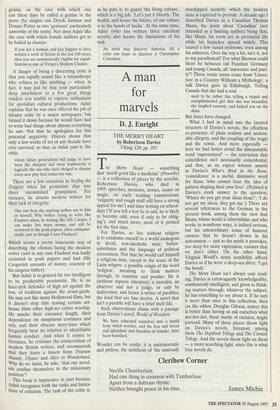A man for marvels
D. J. Enright THE MERRY HEART by Robertson Davies Viking, £20, pp. 385 The Merry Heart — something that `doeth good like a medicine' (Proverbs) — is a collection of pieces by the novelist, Robertson Davies, who died in 1995: speeches, memoirs, stories, essays on magic, on early reading (omnivorous; `vulgarity and rough stuff still have a strong appeal for me') and later writing on school- days Of you tell a boy he is odd, he is likely to become odd, even if only to be oblig- ing'), and much more, most of it printed for the first time.
For Davies, to live without religion is to condemn oneself to a world analogous to decaf, non-alcoholic wine, butter- substitutes and the language of political correctness. Not that he would call himself a religious man, except in the sense of the Latin relegere, a possible origin of the word `religion', meaning to think matters through, to examine and ponder. He is (without express intention) a moralist, an observer and not a judge, or only by indirection, and hence a writer of parables, the kind that are fine stories. A novel that isn't a parable will have a brief shelf-life.
Such observations chime with a passage from Davies's novel, World of Wonders:
We have educated ourselves into a world from which wonder, and the fear and dread and splendour and freedom of wonder, have been banished.
Wonder can be costly; it is undemocratic and pitiless, the antithesis of 'the anxiously worshipped security' which the modern state is expected to provide. A decade ago I described Davies as a Canadian Thomas Mann, the point about 'Canadian' (not intended as a limiting epithet) being that, like Mann, his roots are in provincial life while his branches spread widely. This caused a few raised eyebrows, even among his admirers. Over the top a bit, isn't it, not to say paradoxical? For what likeness could there be between old Faustian Germany and young Canada, all 'innocence and puri- ty'? Those ironic terms come from 'Litera- ture in a Country Without a Mythology', a talk Davies gave in Edinburgh. Telling Canada that she had a soul
used to be rather like telling a stupid and unsophisticated girl that she was beautiful; she laughed coarsely, and kicked you on the shins.
But times have changed.
What I had in mind was the layered structure of Davies's novels, the effortless co-presence of plain realism and undeni- able allegory, and the coupling of the tragic and the comic. And more especially here we had better avoid the disreputable word 'supernatural' — the conviction that coincidence isn't necessarily coincidental, and that, as an expert witness asserts in Davies's What's Bred in the Bone, `coincidence' is a useful, dismissive word for those 'who cannot bear the idea of pattern shaping their own lives'. (Related is Davies's stock answer to the question, `Where do you get your ideas from?': 'I do not get my ideas, they get me.') There are several references to the German in the present book, among them the view that Mann, whose world is labyrinthine and who works in wondrous ways, is indeed serious, but his extraordinary sense of humour ensures that he doesn't drown in his seriousness — just as the mirth it provokes, too deep for noisy expression, ensures that we don't either. On the other hand, Virginia Woolf's acute sensibility affects Davies as if he were a deep-sea diver: 'I get the bends.'
The Meny Heart isn't always easy read- ing. Davies is extravagantly knowledgeable, continuously intelligent, and given to think- ing matters through; whatever the subject, he has something to say about it. If he says it more than once in this collection, then (as the editor, Douglas Gibson, notes) this is better than having us ask ourselves what dot-dot-dot, those marks of excision, might portend. Many of these pieces throw light on Davies's novels, foremost among them The Deptford Trilogy and The Cornish Trilogy. And the novels throw light on them — a more searching light, since this is what true novels do.


















































 Previous page
Previous page